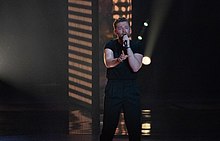Jurijus Veklenko (born 6 July 1990 in Klaipėda), also known as Jurij Veklenko or simply Jurijus, is a Lithuanian singer.
Jurijus | |
|---|---|
 Jurijus performing at the Eurovision Song Contest 2019 in Tel Aviv. | |
| Background information | |
| Born | 6 July 1990 |
| Origin | Klaipėda, Lithuania |
| Occupation(s) | Musician, singer-songwriter |
| Instrument | Vocals |
| Years active | 2014–present |
Eurovision Song Contest
editVeklenko previously performed at the Eurovision Song Contest 2015 as one of the backing singers for Monika Linkytė and Vaidas Baumila in their performance of "This Time"; along with the three other backing singers, Jurijus took part in a same-sex kiss as part of the final performance.
In 2017, Veklenko performed the main vocal for lip-sync drag-act Lolita Zero, in her Lithuanian national final entry "Get Frighten".[1]
Veklenko won the 2019 Lithuanian national final with the song "Run with the Lions", and represented his country at the Eurovision Song Contest 2019 in Tel Aviv.
Personal life
editVeklenko works for a major engineering firm mainly with IT and has said he enjoys the contrast with his musical career.[2] He is of Ukrainian descent.[3]
Discography
editStudio albums
edit| Title | Details | Peak chart positions |
|---|---|---|
| LTU [4] | ||
| Mano Sapnuose |
|
11 |
Singles
edit| Year | Title | Peak chart positions | Album |
|---|---|---|---|
| LTU [4] | |||
| 2018 | "Kartais" | — | Mano Sapnuose |
| 2019 | "Run with the Lions" | 29 | |
| "Skirtingi Pasauliai" (with Inga Jankauskaitė) |
— |
References
edit- ^ "Lithuania: Broadcaster LRT reveals Lolita Zero lip-synced her Eurovizijos atranka performance". Wiwibloggs. Archived from the original on 2 March 2019. Retrieved 24 February 2019.
- ^ "Jurij Veklenko: Lithuania". Eurovision Song Contest. Archived from the original on 26 February 2019. Retrieved 12 May 2019.
- ^ "Eurovision 2019 - Jurij Veklenko". ESCKAZ. Archived from the original on 24 September 2019. Retrieved 23 September 2019.
- ^ a b Peaks in Lithuania:
- "Mano Sapnuose" (album) and "Run with the Lions": "Savaitės klausomiausi (TOP 100)" (in Lithuanian). AGATA. 24 May 2019. Archived from the original on 9 October 2019. Retrieved 19 January 2020.